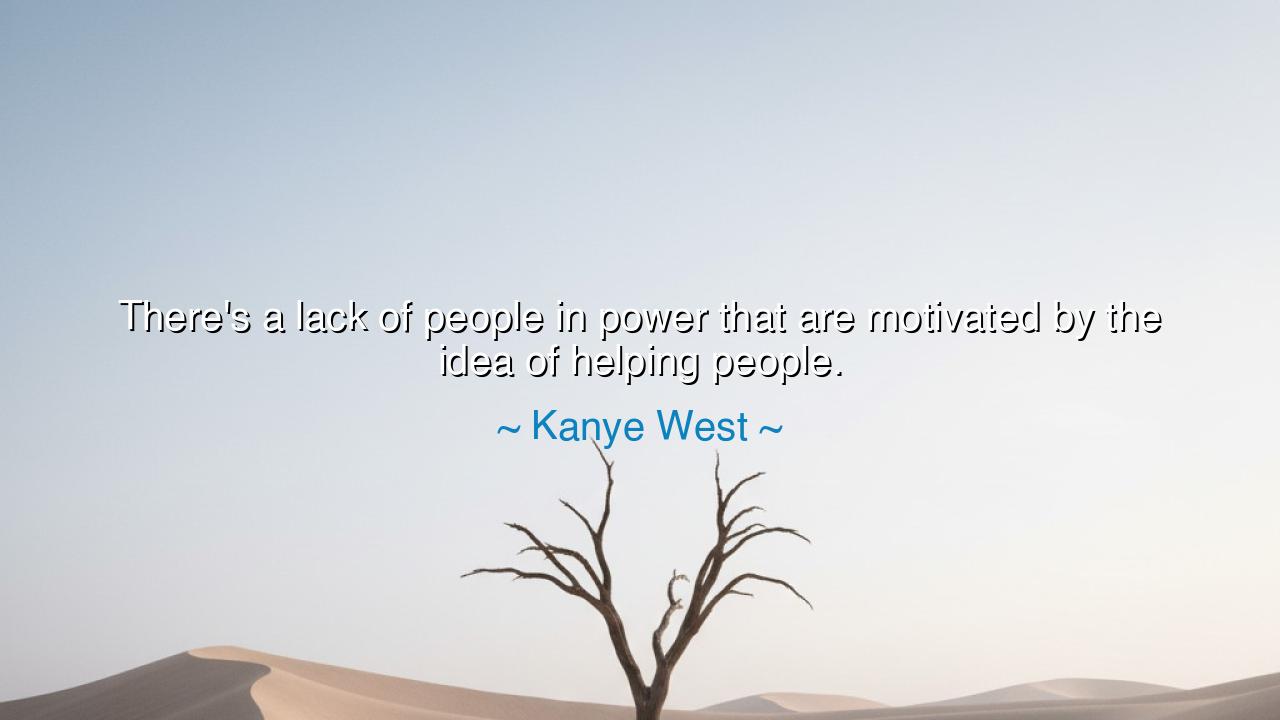
There's a lack of people in power that are motivated by the idea






Hearken, children of the ages, to the bold words of Kanye West, who proclaimed: “There's a lack of people in power that are motivated by the idea of helping people.” In this utterance lies a timeless lament, a recognition of the frailty of governance when authority is divorced from the purpose of service. True power is not merely the dominion of office or the pursuit of wealth; it is the sacred duty to uplift, protect, and guide the people entrusted to its care.
West speaks to the moral imperative of leadership. The rulers of men wield immense influence, yet all too often, their hearts are entangled with self-interest, ambition, or vanity. Authority, when stripped of its service to the common good, becomes hollow, even tyrannical. It is in the alignment of power with the welfare of the people that society finds justice, prosperity, and trust, and without such alignment, the soul of governance decays.
Consider the life of Abraham Lincoln, who, amidst the turmoil of a divided nation, was motivated not by personal gain, but by the sacred duty to preserve the Union and protect human liberty. Though beset by opposition and peril, his decisions were guided by the welfare of the many, demonstrating that the true measure of power lies in the capacity to serve others above oneself. Lincoln’s example illuminates the principle that West articulates: authority gains its noblest expression when rooted in altruism and responsibility.
The ancients understood this as well. Plato, in his vision of the philosopher-king, declared that the rulers of a city should be those who seek not wealth or glory, but the good of the citizens. True leadership, according to the sages, arises from empathy, foresight, and moral conviction, not from ambition untempered by conscience. West’s words echo this ancient wisdom, lamenting the absence of leaders whose hearts and actions are directed toward the welfare of others.
Thus, his counsel is both observation and call to action: society flourishes when power is exercised in service, and falters when rulers pursue only self-interest. Citizens must seek, support, and hold accountable those whose motivation is noble, whose decisions are measured not by gain but by the common good. Leadership divorced from compassion is power without purpose, and history shows that such power is perilous and fleeting.
Carry this teaching, children of future generations: value and cultivate leaders who are guided by service, empathy, and the desire to help others. In doing so, you honor the sacred potential of authority, ensuring that power becomes not a weapon, but a tool of justice, healing, and enduring prosperity. For only when the hearts of rulers are aligned with the welfare of the people does society reach its truest strength and dignity.






LNLinh Nguyen
This observation resonates deeply, though it’s disheartening. It makes me think about how leadership could change if empathy were valued as much as strategy. But I also wonder whether people lose that motivation once they attain power, or if the truly empathetic never pursue power to begin with. Maybe the challenge is cultural—our institutions don’t reward kindness. How could we rebuild leadership structures that encourage compassion rather than competition?
KAKiet Anh
I find this statement powerful because it calls out something most people sense but rarely articulate. There’s often a disconnect between authority and genuine care. But it also makes me curious—how do we measure motivation? Even those who claim to help can act from pride or self-interest. Perhaps the goal shouldn’t be to expect pure altruism, but to design systems that make helping others the most effective path to lasting influence.
NMnguyen may
This comment feels both cynical and insightful. It points to a moral vacuum at the top—people chasing titles, not meaning. I think about how often politics, business, and entertainment reward visibility over virtue. But it also makes me ask, do we as a society enable that by idolizing success more than service? Maybe the problem isn’t just a lack of empathy among leaders, but a collective tendency to admire the wrong qualities.
TNLe Thi Nhan
I completely get what Kanye means here. It’s frustrating to see people gain authority but lose touch with the purpose of serving others. Maybe the real issue isn’t just individuals, but the environments that encourage self-interest. I wonder what it would take to make compassion a prerequisite for leadership instead of charisma or connections. Is it even possible to hold power and still act selflessly, or does power inevitably corrupt that impulse?
YVha yen vy
This statement hits hard because it feels painfully true. So many people in leadership roles seem driven by ego, money, or influence rather than compassion. I find myself wondering—why does power so often erode empathy? Maybe the system itself rewards ambition over altruism. Still, I think there are exceptions—leaders who genuinely care but struggle against the machinery of politics or profit. Can power and pure intention really coexist in today’s world?